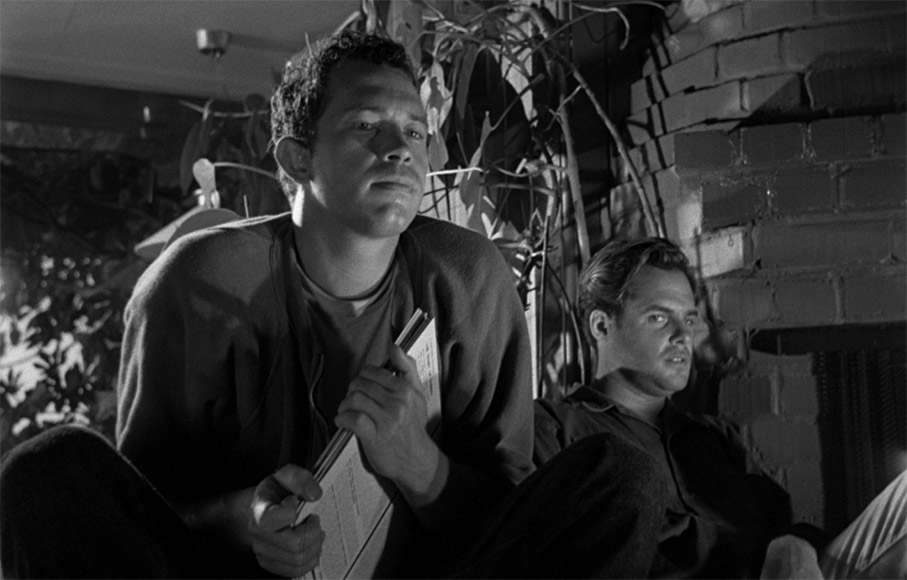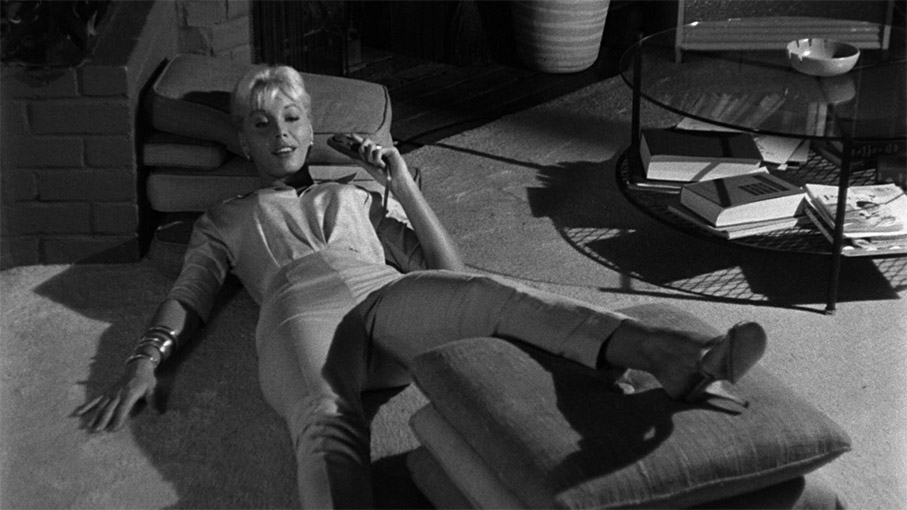|
Two young drifters named Duke and Boots walk up to the road from a California shoreline and take stock of their location, like alien creatures who have just emerged from the ocean. At a nearby garage they ask a mechanic for a couple of bottles of orange pop, but when he insists they have to pay, Duke makes it clear that they'll be taking them anyway and it's best that he doesn't kick up a fuss. As they sit and drink their stolen sugary liquid, it's revealed that the not-too-sharp Boots is sexually inexperienced and that Duke's set mission is to hook him up with a girl so that he might lose his virginity.
A short while later, travelling salesman Ed Hogate rolls up at the garage in the sort of open-top car he probably bought specifically to impress. It works on Duke, who cheerfully engages him in conversation and slyly blags a lift for himself and Boots, something the reluctant Ed only agrees to because he doesn't seem sure how to comfortably refuse them. They're about to depart when the attractive and well-to-do Kate pulls up at the garage to ask for directions, and Duke decides in an instant that this is the woman he wants for Boots, and convinces Ed to trail her as she heads into the city.
It's an intriguing opening, one that having quickly established Duke and Boots as central characters then makes it clear that they're not going to be comfortable company to keep. It's certainly easy to feel for the mechanic's nervous response to Duke's veiled threat about the orange pop, and for Ed's discomfort at being press-ganged into giving a ride to two men he'd probably never normally have let into his car. These guys are clearly trouble, but it's when Ed tries to drop them off and depart for his sales conference that we are shown how potentially dangerous they are. When Duke's gentle cajoling of Ed to keep following Kate's car fails, he takes a considerably more threatening approach, graphically outlining what Boots will do to him with his knife should he fail to comply, a carefully worded threat that is shot from the sort of unexpected angle that alone suggests that Duke is a coiled spring of potentially lethal violence.

A little surprisingly, the home invasion narrative that this seems to be building to doesn't play out in the expected manner. Instead of raiding Kate's house, Duke and Boots work out that that property next door has been empty for some time and break in and take residence, making themselves comfortable in an upstairs room, where they watch Kate in her garden as she swims and lays in the sun and analyse her relationship with her businessman husband Roger. And yes, this is every bit as creepy as it sounds and darkened further by the knowledge that their ultimate goal is to sexually assault the woman they are furtively watching. Thus when Duke decides to pay Kate a call, first under the guise of someone who has lost their way and then later as a handyman looking for work, audience nerves will really begin to twitch. Mine certainly did. But it soon emerges that Duke's initial assessment of Kate's dissatisfaction with aspects of her marriage may be on the nose, and far from representing a threat his youthful physicality awakens in her feelings that Roger appears to no longer have any real interest in arousing. And while the stated purpose of his slow seduction of Kate is to prepare her for Boots, Duke finds himself falling for her instead and starts to become tortured by the idea of giving her to another. The work of first-time feature director Leslie Stevens – who went on to be the key creative force behind The Outer Limits TV series – it was shot largely in and around his own Beverley Hills home and stars his then wife Kate Manx, who four years later would fall victim to suicide, the knowledge of which can't help colour how you view the film and Kate's moments of unhappiness or personal torment.
As it was with James Landis's startling 1963 thriller The Sadist, being confronted by Private Property for the first time so long after its release delivers a real jolt. This is due in no small part to a nature and strength of content that here seem completely out of whack for a film made back in 1960, but also because, like The Sadist, it's hard to understand how such a film has flown under the radar for so long (though it was at one point considered a lost work). It's certainly the knowledge that we're watching a film made in 1960 that delivers some of the film's biggest surprises, notably the risky decision to align the audience with two compelling but unlikeable sociopaths, a tactic also employed by a certain notorious Alfred Hitchcock thriller released the same year. But there is also an underlying sexual tension here that seems to be throwing a stiff middle finger up at contemporary censorial attitudes (it was, we are assured, condemned by the preposterously named Legion of Decency in its native America). This is first clearly evident when Kate and Roger share an evening meal, and while Roger enthuses about the luxurious boat he is having built, Kate's unspoken yearning for children and her husband's affection prompts her to stroke the dinner table candle in a manner that would prompt even Freud himself to sit up and take notice. Intriguingly, this scene is intercut with one where Duke and Boots share a dinner cooked from freshly stolen supplies (a robbery suggested in a single economical edit), and as Kate strokes her candle, Duke questions Boots in a manner that suggests he's not actually known him that long, but with a large cigar protruding phallically from his mouth the whole time. Read into that what you will. That some have also detected homoerotic overtones in the relationship between Duke and Boots is not surprising, but the two men seemed to me more like those terrifying drifters played by Stephen McHattie and Greg Bryk in Cronenberg's A History of Violence might have been when they first hooked up and hit the road.

Private Property – handsomely restored in 4K by Cinelicious from previously lost elements rediscovered and preserved by UCLA Film & Television Archive – is rarely a comfortable film to watch, but it's always gripping and there's plenty going on just beneath the surface. Its critique of the hollow nature of middle class Los Angeles life casts Roger as over-aspirational and self-absorbed, Kate as an unhappy and unfulfilled woman living behind a mask of false contentment, and their marriage as essentially sterile. In this world, the road to sexual fulfilment clearly comes at a cost that Kate does not yet realise she will be expected to pay, and by drawing out the process of her gradual seduction and intermittently reminding us of Duke's true intentions, Stevens underscores even the friendliest of exchanges with the threat of potential violence.
Performances really matter here and the casting is spot on. Manx pulls off a sometimes heart-breaking balance of fragility, false cheer and tormented longing, and as the lethal Duke and the slower-witted Boots, Corey Allen and a young Warren Oates are consistently excellent. Allen in particular is at the top of his game here, keeping his psychosis bubbling just beneath the surface, frightening in his unpredictability and his way with words and utterly convincing in his one key moment of tortured anguish. Stevens' assured and often stylish direction also has its striking moments, which peak in an extraordinary climactic confrontation that takes place underwater in a darkened swimming pool and plays out as a whirlwind of silhouetted mid-shots and impressionistic close-ups.
In its story and approach, Private Property feels almost like an independent feature from the early 1970s that was transported back in time and unleashed on a public who would likely have seen nothing quite like it before. While characters are nominally cast as good and bad, we are invited to engage with both sides, and to embrace the notion that true happiness sometimes comes at a steep price and for many of us may simply be beyond our grasp. It's a tense, impressively performed and directed work, thematically rich and ultimately sobering, and a film that fans of urban noir thrillers should make all efforts to see.
Private Property will be creening at the 60th BFI London Film Festival on the following dates:
Saturday 08 October 2016 20:45
Curzon Soho Cinema, Screen 1
Sunday 16 October 2016 20:45
Prince Charles Cinema (2K screening)
The 60th BFI London Film Festival runs from 5th to 16th October 2016.
For further information on the films being screened and to buy tickets for showings, head here:
https://whatson.bfi.org.uk/lff/Online/
|